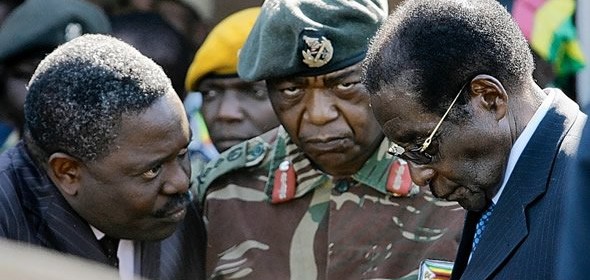- WICKNELL CHIVAYO left school at 15
- DISGRUNTLED Zimbabwe police stage uniform protest.
- MNANGAGWA wife Auxillia drops charges against nine women who boed her in Manicaland
- O.J. Simpson dies of cancer , aged 76.
- South Africa ANC is the cause of ZIMBABWE troubles claims Zimbabwe opposition politician Job Sikhala
Though Dangerous, Street Protests, Remain The Most Viable Tool Against Mugabe’s Oppressive Authority

OF LATE, opposition political parties have intensified their calls for mass action against President Robert Mugabe’s “failed” leadership.
The MDC-T demonstrations are meant to force the Zanu PF led administration to deliver on its pre-2013 election promises top among them the creation of 2, 2 million new jobs.
Inspired by the recent student protests in South Africa, coined around the FeesMustFall mantra, Tendai Biti’s PDP has also threatened to roll out its own MugabeMustFall demos.
Only last Friday, some 21 students from various tertiary colleges were arrested in the CBD as they tried to march to Parliament in a failed attempt to hand over a petition.
Since the massive food riots that rocked Harare and some parts of the country in 1998 and the ZCTU organised job boycotts then, anti-government forces have routinely failed to organise effective protests.
President Mugabe has made street protests virtually difficult through the introduction of a raft of security laws which have criminalised such protests without police permission.
Coupled with that, the state has often responded with arrests and abductions on identified young individuals within political parties and civil society who have the energy to stir up successful mass protests against the current regime.
Top among these was the 2008 abduction and killing of MDC-T youth activist Tonderai Ndira, while lately, nothing has also been heard from journalist-cum-pro-good governance activist Itai Dzamara, abducted in March this year.
In 2011, the state also pounced on former MDC legislator and rabblerousing Munyaradzi Gwisai and a host of youths against whom treason charges were pressed for plotting the Egypt style overthrow of the government.
Same year, then MDC-T youth chair and firebrand Solomon Madzore was also incarcerated for nearly a year for allegedly taking part in the killing of a police officer by party activists.
There were claims by party sympathisers he was deliberately being removed from playing a part in the opposition’s youth mobilisation efforts ahead of the 2013 elections.
After ridding itself of these, government has moved this year to rid the Harare CBD of thousands of illegal vendors after state intelligence is thought to have linked their continued street presence to a ticking time bomb.
With such adversities lying in the wake of advocates of demonstrations, are street demonstrations still a viable strategy for mass resistance and change of government in Zimbabwe?
Political analyst Pedzisayi Ruhanya believes they are if only they were organised well.
“It depends on the nature of the mobilisation that is there. So far, what we have been having are internet and newspaper threats by political parties,” Ruhanya said in an interview with NewZimbabwe.com.
“When people say they want a protest, they must mobilise their constituents.”
Rejoice Ngwenya, another Harare based political analyst, said those spurred by the successful South African student protests in their bid to oust Mugabe could be reading the wrong template as the Zimbabwean scenario was closer to that of Burundi which has recently witnessed killings of anti-government protesters.
“In South Africa, protests did force compliance but in the context of Zimbabwe, they won’t work because you are already dealing with a Pierre Nkurunziza (Burundi President) type of government; it will only incite the state to shoot at you,” Ngwenya said.
He added: “Even if they don’t work but they have to be done; there is no other option, the constitutional course is already closed.
“It is better to try and see what happens than not try at all but they have to be very organised and very aggressive.
“The current generation of youths is not having the populist activism and did not grow up in a culture of revolution and are poorly resourced to stage effective protests.”
PDP spokesperson Jacob Mafume insisted street protests were a window availed to citizens by the national constitution to demonstrate their continued disgruntlement towards the current leadership.
“They are a success in so far as they can be a manifestation of discontent over the way in which the country is being run,” Mafume said.
“We have not had much success using demonstrations as a way of changing government much as we have not had much success using elections as a way of changing the same government.
“However, should we abandon elections simply because we have not been successful there?
“I do believe the legitimately accepted methods of changing systems and governments in the current set up are either peaceful elections or peaceful demonstrations and we cannot abandon these methods simply because we have failed in the past for one reason or the other.
“What that means is that we must just do them better, and more efficiently, in a more sustainable manner.”
Addressing party supporters in Gweru early this year, MDC-T leader Morgan Tsvangirai warned that the demonstrations should be well-timed to avoid playing into Zanu PF’s hands.
“The issue of mass demonstrations is always on the agenda, but it should not be an emotional reaction. There is always need to assess the timing of such an action and what we want to achieve by such (street protests),” he said.
“People should be made aware of the outcome of that action.” source-newzimbabwe